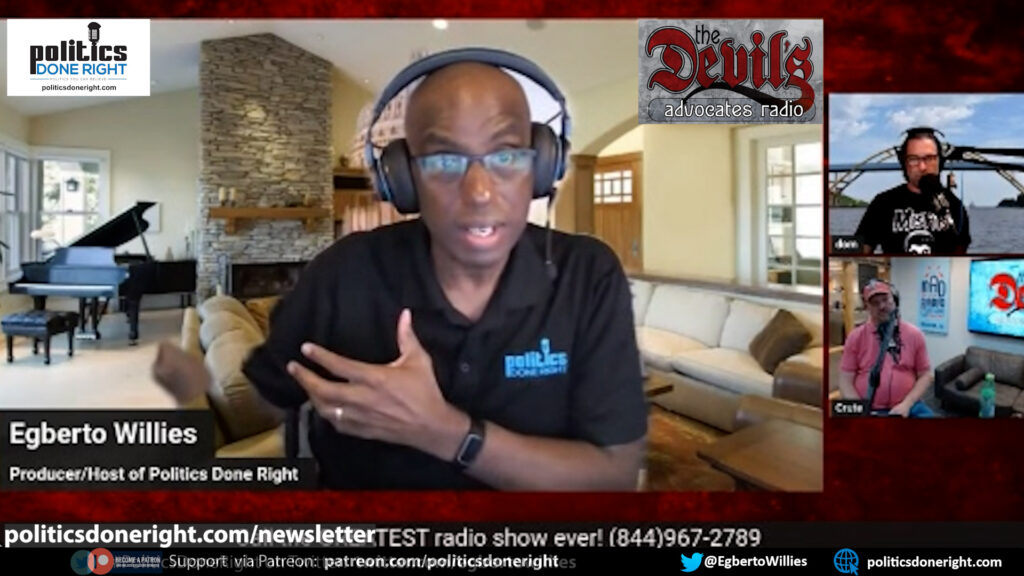I was honored to appear on The Devil’s Advocates Radio Show with host Mike Crute in Madison, Wisconsin. We discussed engaging the other side techniques and info from my book, It’s Worth It: How To Talk To Your Right Ring Relatives, Friends, and Neighbors.
Devil’s Advocates Radio interview.
Egberto Willies’ appearance on The Devil’s Advocates Radio Show underscores a critical issue that the progressive community faces: the importance and challenge of open dialogue in hyper-polarized times. One of Willies’ central theses is that talking to the “other side” is feasible and necessary for real change. He asserts that although it may seem like a Herculean task, discourse is vital for the democratic process. His philosophy aligns with thinkers like Noam Chomsky, who has often emphasized the need for open dialogue.
In this clip:
- Egberto Willies, host of “Politics Done Right,” appeared on The Devil’s Advocates Radio Show to discuss his new book “It’s Worth It” and his philosophy on engaging with politically opposed groups, such as MAGA supporters.
- Willies advocates for open dialogue with those holding opposing views, stating that one-on-one conversations can yield change. He reveals he has letters proving that people have changed their minds after listening to his podcasts or dialogues.
- The host of Politics Done Right, located in Houston, Texas, a blue spot in a red state, has been in the progressive talk radio sphere for over a decade. Despite the current political climate and obstacles, he believes most people don’t align strictly with the “red” label often applied to states like Texas.
- Willies draws a line between those he believes can be reached through dialogue and those who knowingly spread misinformation, such as political figures like Ron Johnson or Donald Trump. He states he would not give them airtime on his show.
- When asked about other current events, like a hypothetical debate between Governors Gavin Newsom and Ron DeSantis moderated by Sean Hannity, Willies advises against it due to the risk of media manipulation and soundbite misrepresentation.
A standout point is Willies’ differentiation between those open to dialogue and those who knowingly perpetuate misinformation. It’s a point that resonates with experts like Timothy Snyder, who, in his book “On Tyranny,” argues that truth is the cornerstone of democracy. Willies recognizes the importance of differentiating between those who are confused and potentially reachable versus those who are disseminating falsehoods for political gain. By doing so, he directs his focus towards fostering conversation where it can be most impactful. This approach also seems to tie back to the ethics of “effective altruism,” a concept championed by philosophers like Peter Singer, whose goal is to do the most good for the most number.
Egberto takes a very humanistic approach towards those with opposing views, stating that if they are “ill,” in a sense, it’s our duty as compassionate individuals to help, not harm. It’s a standpoint that finds resonance in the works of social scientists like Brene Brown, who argues for the power of vulnerability and understanding in combating social divisions.
The nuance in Willies’ viewpoint also leads to questions on limits and boundaries in dialogue. His skepticism about engaging figures like Ron Johnson and Donald Trump echoes growing concerns about the “platforming” of individuals who knowingly spread misinformation or sow division, a subject of debate within progressive circles.
Willies’ perspective adds a nuanced layer to the ongoing debate within progressive circles about the efficacy and ethics of engaging with those who hold opposing viewpoints. It’s an urgent question that will only become more relevant as we navigate the complexities of a divided nation.
Viewers are encouraged to subscribe and join the conversation for more insightful commentary and to support progressive messages. Together, we can populate the internet with progressive messages that represent the true aspirations of most Americans.

